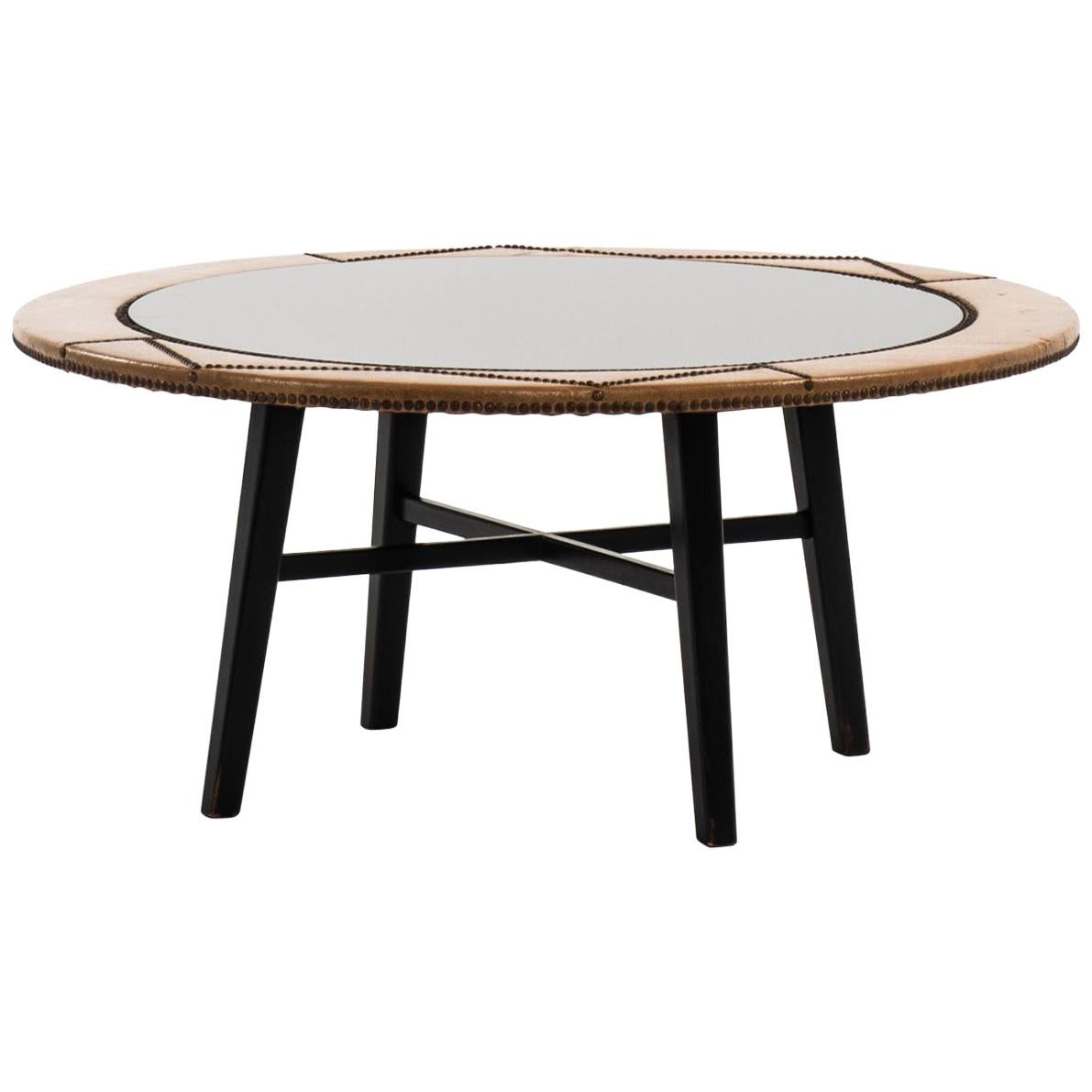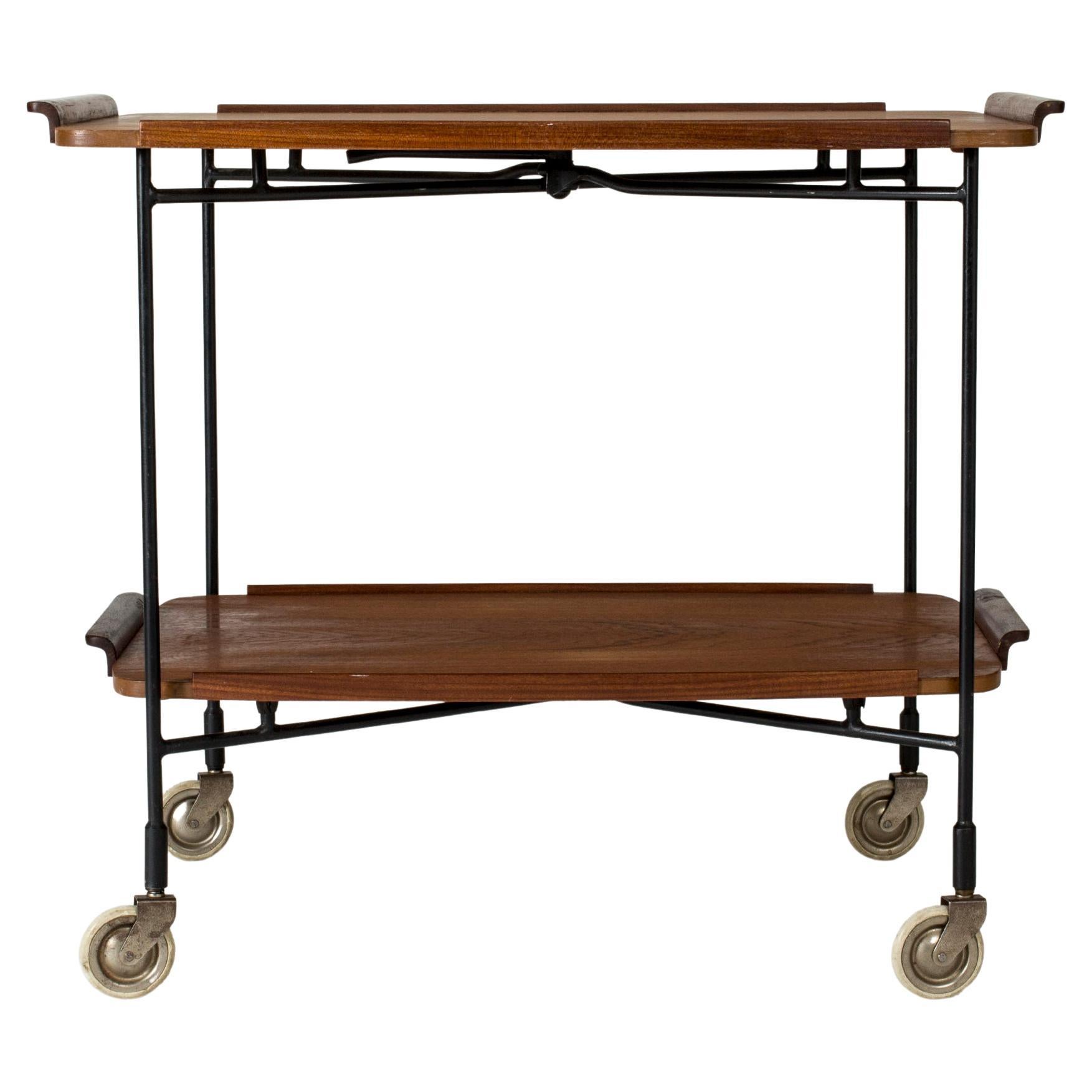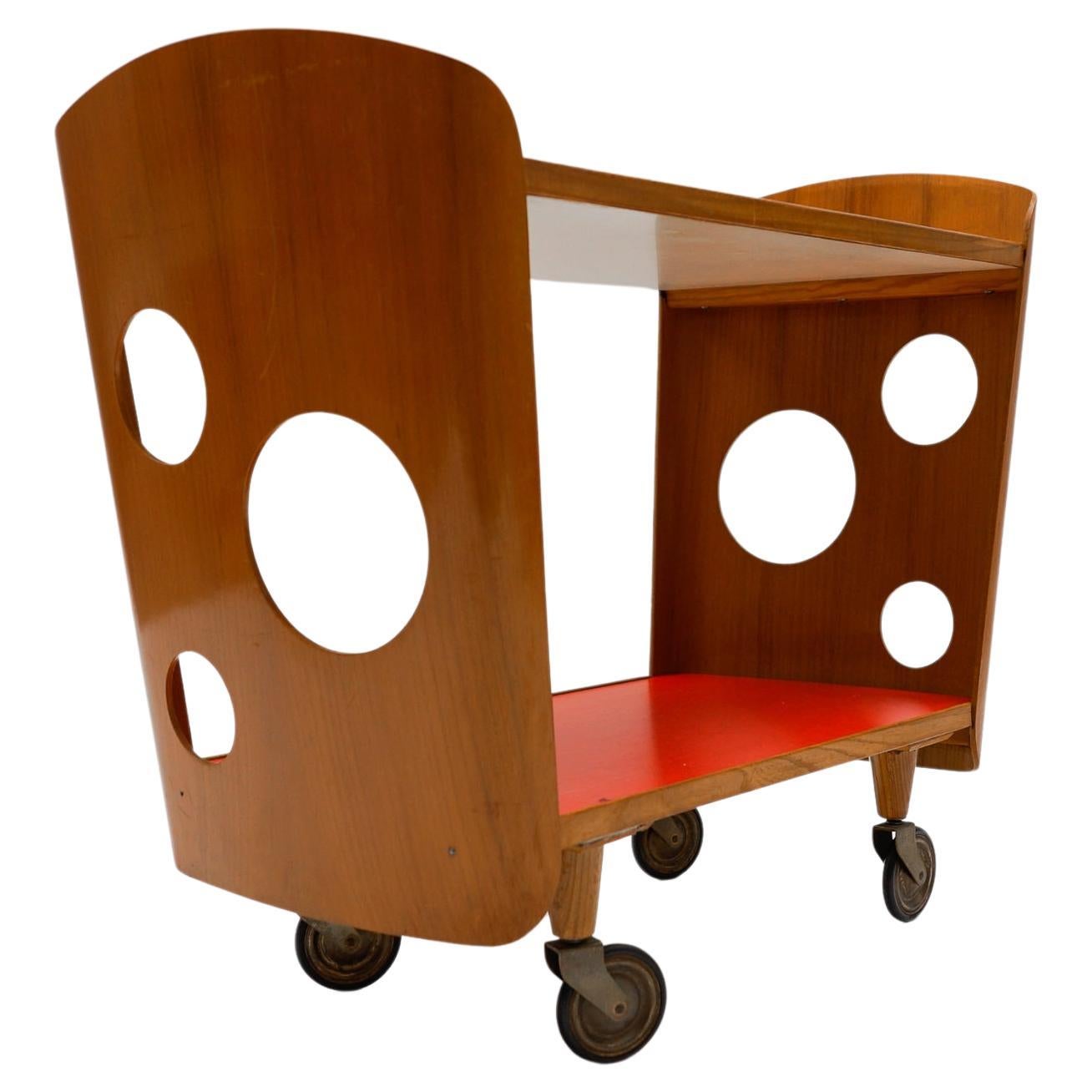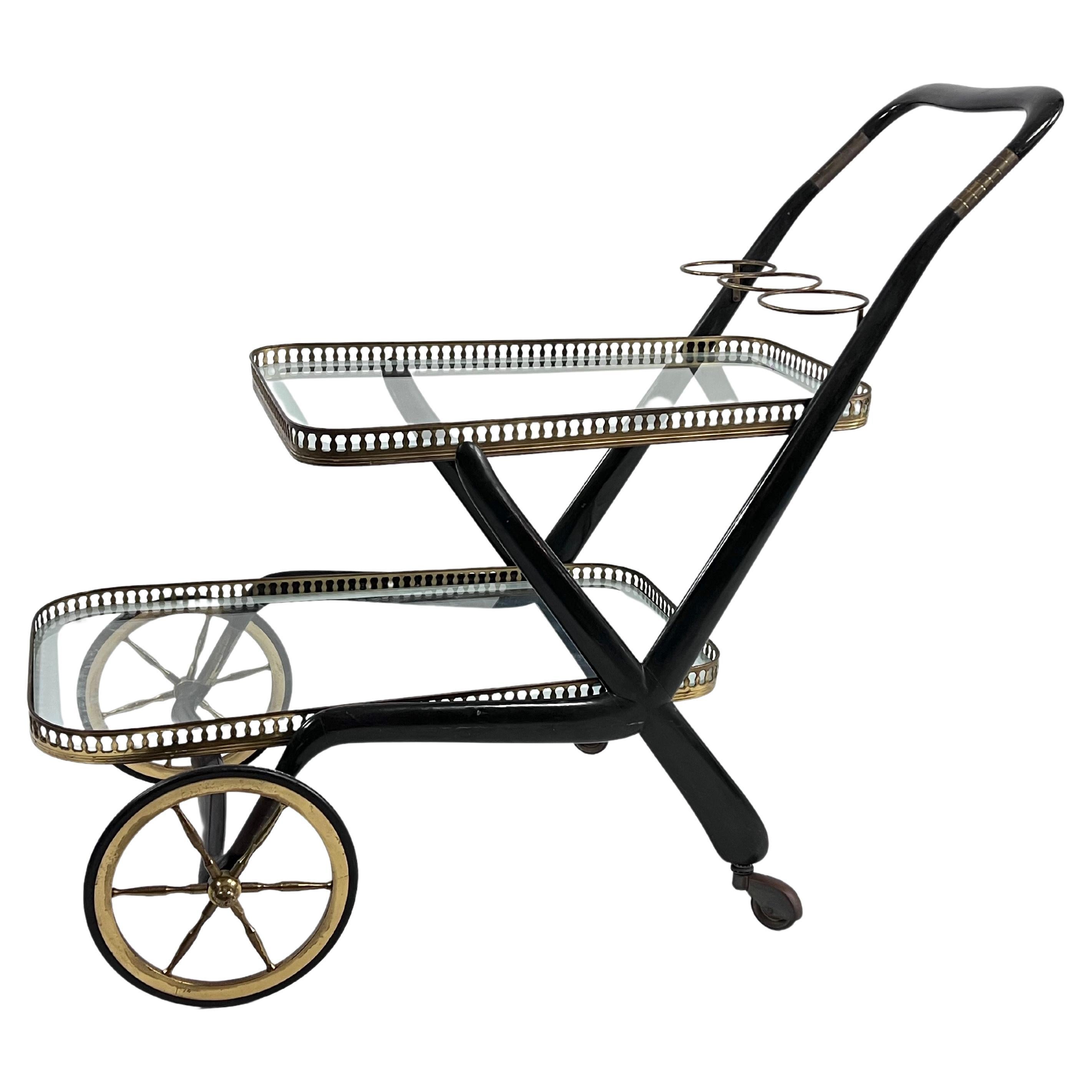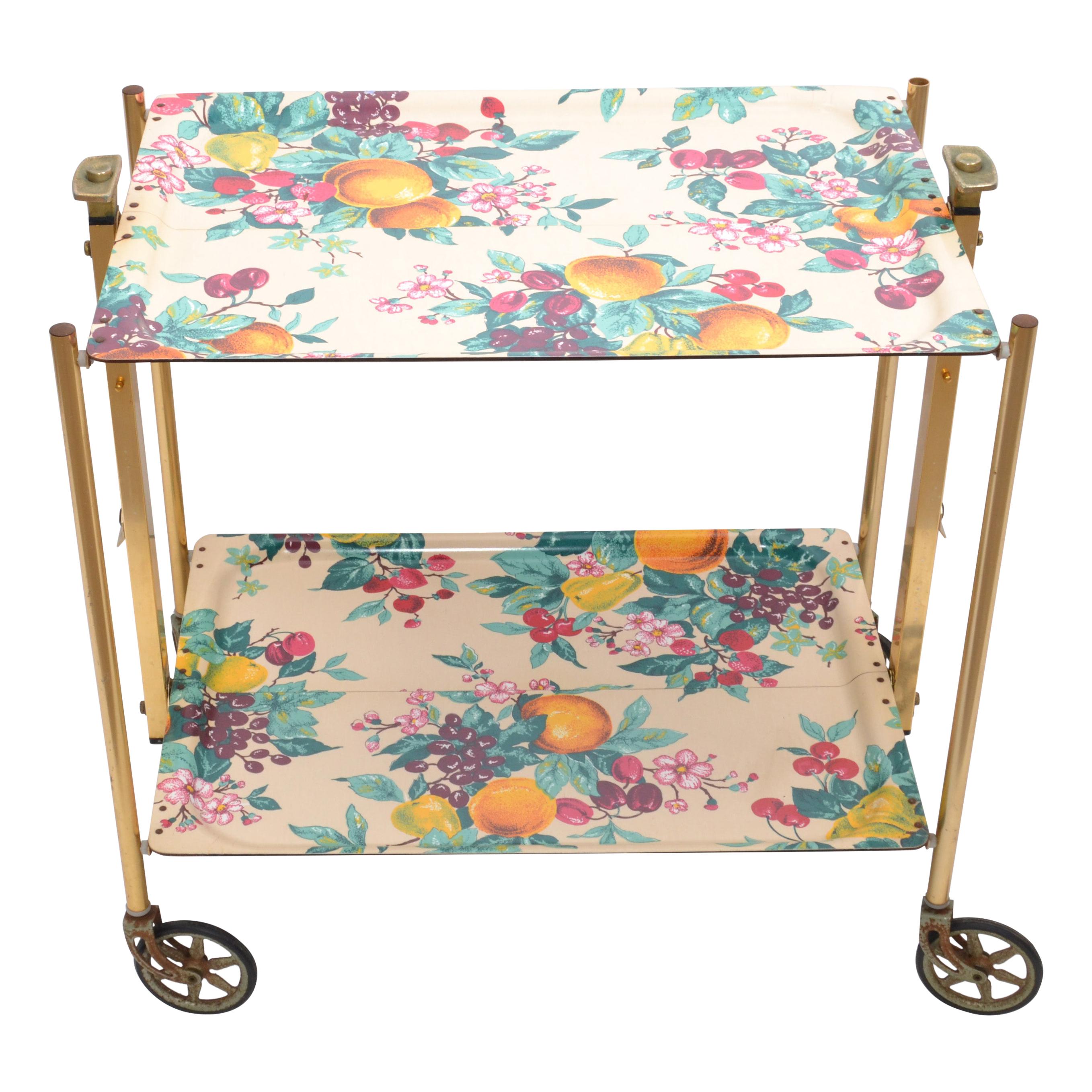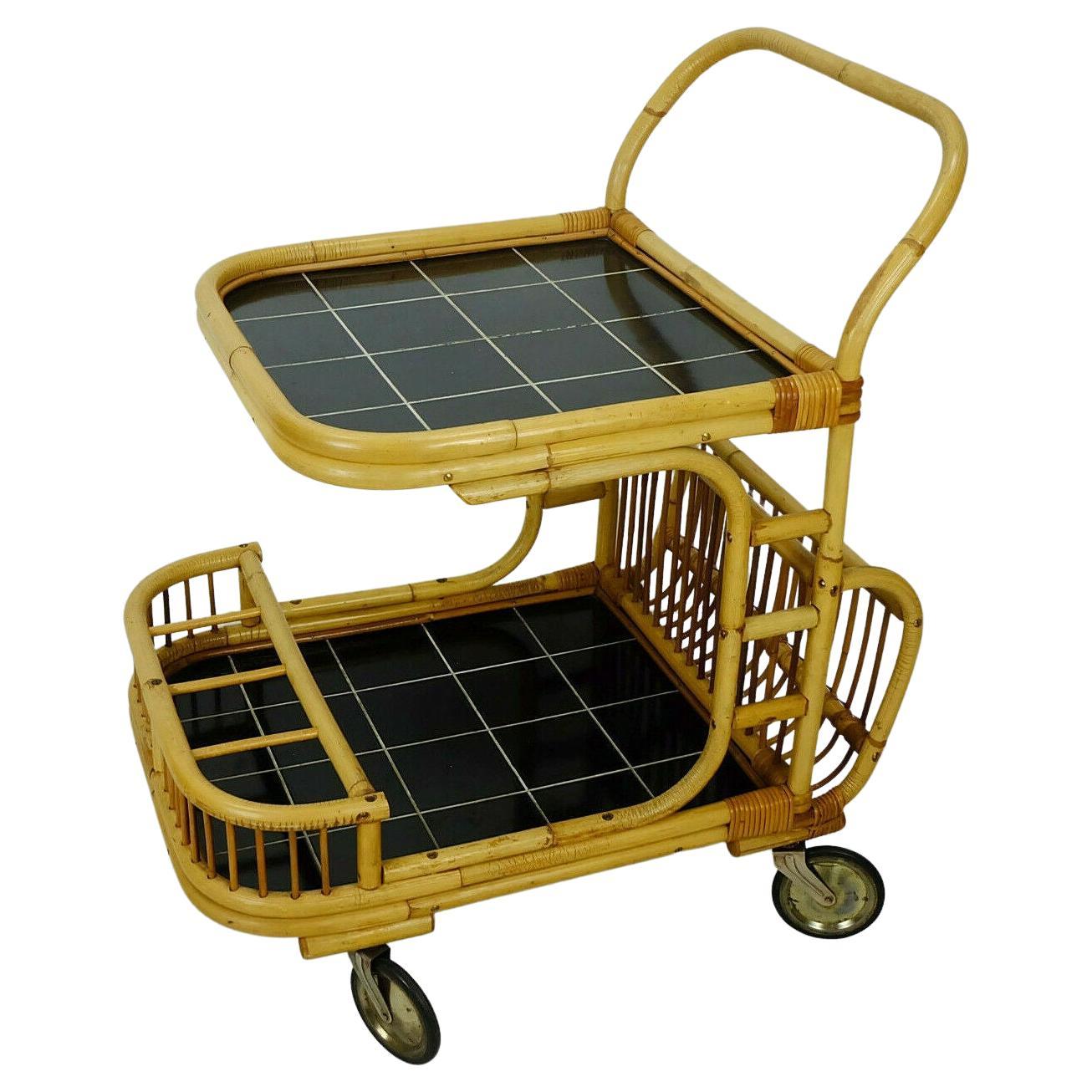Mid Century Serving Cart by Otto Schulz, Boet, Sweden, 1950s
About the Item
- Creator:Otto Schulz (Designer),Boet (Maker)
- Dimensions:Height: 21.86 in (55.5 cm)Width: 33.08 in (84 cm)Depth: 16.54 in (42 cm)
- Style:Scandinavian Modern (Of the Period)
- Materials and Techniques:
- Place of Origin:
- Period:
- Date of Manufacture:1950s
- Condition:Wear consistent with age and use.
- Seller Location:Stockholm, SE
- Reference Number:1stDibs: LU1638230324492
Otto Schulz
Throughout his career as an interior and furniture designer, publisher and founder of the Swedish furniture company Boet, Otto Schultz was a key figure in promoting mid-century modern Scandinavian design.
Born in Germany in 1882, Schultz moved to Sweden in 1907, where he became interested in designing furniture and interiors. In 1920, Schultz founded his furniture company Boet in Gothenburg, where he created functional and traditional designs featuring quintessential elements of Scandinavian furnishings. Around the same time, Schultz started the design and living magazine Boet, which published articles and profiles highlighting Sweden’s most influential architects and designers. He served as Boet’s publisher and editor until 1938.
During the 1930s, Schultz created a range of opulent Scandinavian modern and neoclassical furniture, including cabinets, secretaires and side tables, using fine woods like elm, birch, mahogany and walnut. Many of his pieces showcased his patented use of decorative nails called Bopoint.
He was best known for the Schultz lounge chair, which he designed in 1936. Its voluptuous design featured a generous seat and a large, curved backrest and it was upholstered with a luxurious blend of alpaca and wool. The Schultz chair was highly popular in Sweden in the 1940s. While Boet originally produced it, Swedish furniture manufacturer Jio Möbler took over its production in 1941.
Schultz operated Boet until his retirement in 1950. He died in 1970. Today, Schultz’s pieces are favorites among interior designers and collectors seeking a mix of modern Scandinavian simplicity and lavish decorative style.
On 1stDibs, discover vintage Otto Schultz seating, storage cabinets and case pieces, tables and more.
- ShippingRetrieving quote...Ships From: Stockholm, Sweden
- Return PolicyA return for this item may be initiated within 14 days of delivery.
- Pair of Lounge Chairs by Otto Schulz, Boet, Sweden, 1940sBy Otto Schulz, BoetLocated in Stockholm, SEPair of beautiful lounge chairs by Otto Schulz, upholstered with luxurious dark green velvet. Loose cushions. Generous, elegant design, gr...Category
Vintage 1940s Danish Scandinavian Modern Lounge Chairs
MaterialsVelvet, Wood
- Teak Serving Cart from Firma Glas & Trä, Sweden, 1950sBy AB Glas & TräLocated in Stockholm, SEVery cool serving cart from Firma Glas & Trä, made from black lacquered metal and teak. The two teak trays can be lifted off and the cart folded. Elegant details.Category
Vintage 1950s Swedish Scandinavian Modern Carts and Bar Carts
MaterialsBrass
- Scandinavian Modern sideboard by Otto Schulz, Sweden, 1930sBy Otto Schulz, BoetLocated in Stockholm, SEElegant functionalist sideboard by Otto Schulz, with bold lines and contrasting birch and darker colored wood. Large round drawer handles with decorative ...Category
Vintage 1930s Swedish Scandinavian Modern Sideboards
MaterialsBirch
- Midcentury "Party Cart" serving cart by Carl Malmsten, Sweden, 1940sBy Carl MalmstenLocated in Stockholm, SEAdorable serving cart by Carl Malmsten, called “Kalasskrindan”, which means “Party Trolley”. Sleek lines with nicely curved handle. Removable tray on legs.Category
Vintage 1940s Swedish Scandinavian Modern Carts and Bar Carts
MaterialsPine
- Faux Leather and Brass Mirror by Otto SchulzBy Otto Schulz, BoetLocated in Stockholm, SELarge wall mirror by Otto Schulz. Frame dressed in dark blue faux leather, decorated with numerous brass nails. Nice combination of elegance and playfulness.Category
Vintage 1950s Swedish Scandinavian Modern Wall Mirrors
MaterialsBrass
- Vintage serving cart by Ilmari TapiovaaraBy Ilmari Tapiovaara, Keravan Puuteollisuus OyLocated in Stockholm, SECool serving trolley by Ilmari Tapiovaara, made from birch. Small wheels, sled legs. Table top lacquered lipstick red.Category
Vintage 1940s Finnish Scandinavian Modern Carts and Bar Carts
MaterialsBirch
- Otto Schulz Coffee Table Produced by Boet in SwedenBy Otto SchulzLocated in Limhamn, Skåne länRare coffee table designed by Otto Schulz. Produced by Boet in Sweden.Category
Vintage 1930s Swedish Scandinavian Modern Coffee and Cocktail Tables
MaterialsBrass
- Stunning Mid-Century Modern Serving Cart in Plywood, 1950sLocated in Nürnberg, BayernStunning midcentury round serving cart in bamboo and metal. This unique piece was produced in Austria in the 1950s.Category
Vintage 1950s Austrian Mid-Century Modern Carts and Bar Carts
MaterialsMetal
- Rare Mid-Century Cesare Lacca Serving Bar Cart, Italy, 1950sBy Cesare LaccaLocated in Catania, CTOriginal vintage condition with normal trace of age and use with patina on the brass for this Italian bar cart designed by Cesare Lacca and produced during the 50s. Glasses with no c...Category
Mid-20th Century Italian Mid-Century Modern Carts and Bar Carts
MaterialsBrass
- French Mid-Century Modern Brass & Laminate Serving Cart, Trolley, Textable 1950sLocated in Miami, FLColorful Mid-Century Modern brass and laminate trays serving cart, trolley from the 1950s made by Textable, France. With 2 pushdown buttons it folds down easily for storage, very pr...Category
Vintage 1950s French Mid-Century Modern Carts and Bar Carts
MaterialsBrass
- 1950s Midcentury Trolley Bamboo Serving CartLocated in Mannheim, DEVery beautiful and decorative 1950s tea cart / serving trolley. The base is made of wood, bamboo and wicker, the shelves are covered with black formica with tile pattern. The wheels ...Category
Vintage 1950s European Mid-Century Modern Carts and Bar Carts
MaterialsBamboo, Wicker
- Mid century PT10 serving cart by Cees Brakeman for Pastoe, Netherlands 1950sBy Cees Braakman, PastoeLocated in ECHT, NLMid century serving cart. Model PT10 designed by Cees Brakeman for Pastoe in the 1950s. It has two trays made of shaped plywood. The frame is also made of plywood. Well designed piece with very nice details. It stands on the original castors. The cart can be disassembled. It was sold originally as flat packed furniture. For shipping it will be disassembled for safer and easier transport. Easy to put back together again with the original brass bolts. The wood gained a beautiful dark patina through the years. UMS Pastoe b.v. is a Dutch furniture manufacturer from Utrecht, which designs and produces furniture under the Pastoe brand name. This company was founded on April 13, 1913 in Utrecht as UMS, which stood for Utrechtse Machinale Stoel- en Meubelfabriek. The name Pastoe comes from "passe partout" and was added to the name after the Second World War Well-known designs are the wire steel chair SM05 by Cees Braakman and Adriaan Dekker, the cabinets by Aldo van den Nieuwelaar and Vision by Karel Boonzaaijer and Pierre Mazairac. Pastoe has worked with graphic designers such as Dick Bruna and Benno Premsela, photographers such as Ed van der Elsken and Cas Oorthuys and designers such as Shiro Kuramata, Shigeru Uchida, Maarten Van Severen and Vincent van Duysen. Frits Loeb founded the factory in 1913 under the name Utrechtse Machinale Stoel- en Meubelfabriek (UMS). This was located at Oosterkade 30 in Utrecht. The furniture that was produced was initially intended for his store at the Ganzenmarkt in Utrecht, but soon it was sold at various points of sale in the Netherlands. When the space on the Oosterkade had become too small, the factory moved around 1918 to the building of the former Tegelfabriek 'Holland' on the Rotsoord. Since 2016, the factory has been on the Tugboat in Houten. UMS focused on the general public with its furniture. Business manager and designer Dirk Lubertus Braakman varied on the designs of the Amsterdam school. Although the business design style did not suit the taste of the general public, UMS continued to engage in innovative design, with influences from Scandinavia and art deco. After World War II After the Second World War, Loeb found an empty factory. He decided to rebuild UMS, with his cousin Frits Ullman assisting him. In the first years after the war, UMS mainly worked on behalf of third parties and did not yet have a permanent collection. Around 1947, the factory set a different course, with contemporary design central. In 1948, the new brand name Pastoe was introduced, which was added to the abbreviation UMS. Business manager and designer Cees Braakman, after a study trip through the United States, introduced a new technique of curved plywood and persuaded Loeb and Ullman to use this production method. Due to the use of this new technique, no more reference was made to the craft. New materials such as plywood finished with oak and birch veneer characterized the designs. The new production technique provided the subdued and sober design that later became the company's trademark. UMS Pastoe joined the Good Living Foundation. The focus of the UMS Pastoe collection was mountain furniture, where the consumer could put together a cabinet himself. This new concept of flexible cabinet systems was developed in 1955 in the cabinet system Meubelen-naar-maat. In this series, the cabinet could not only be assembled by the consumer himself, but also expanded later. This series was a great success at home and abroad. This became clear when the teak version was awarded a silver medal in 1957 at the 11th Triennale in Milan and Le Signe d'Or in Belgium. In 1968, the company received the BKI Award for the innovation of PVC-coated chipboard that is milled transversely; the plates could then be folded into a cube. This technique was applied in the 1967 Pastoe Cube...Category
Mid-20th Century Dutch Mid-Century Modern Carts and Bar Carts
MaterialsPlywood
